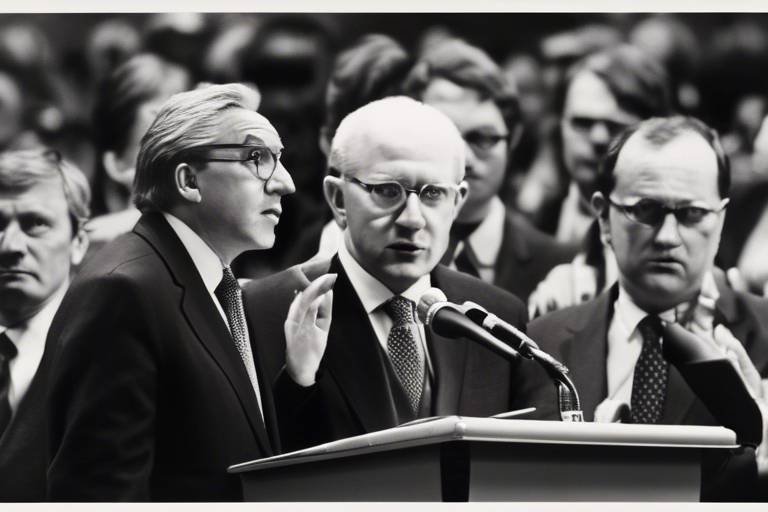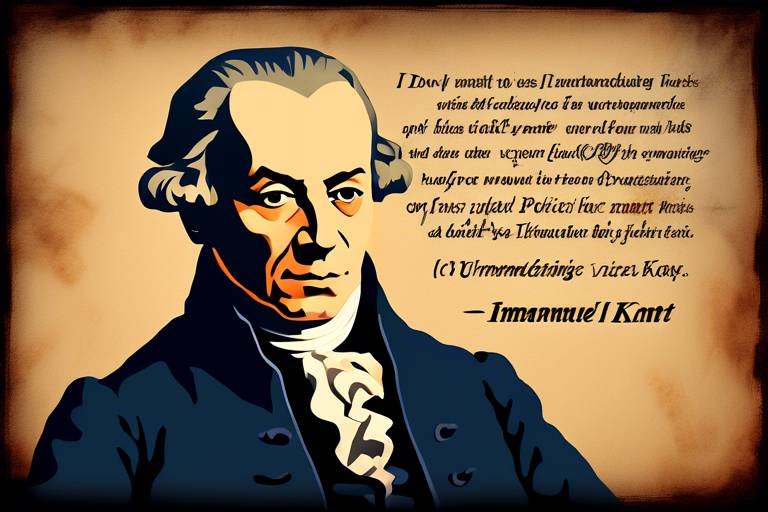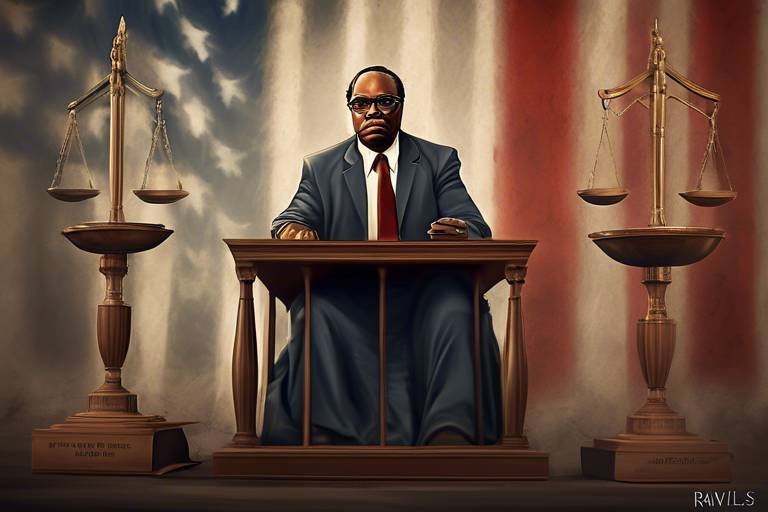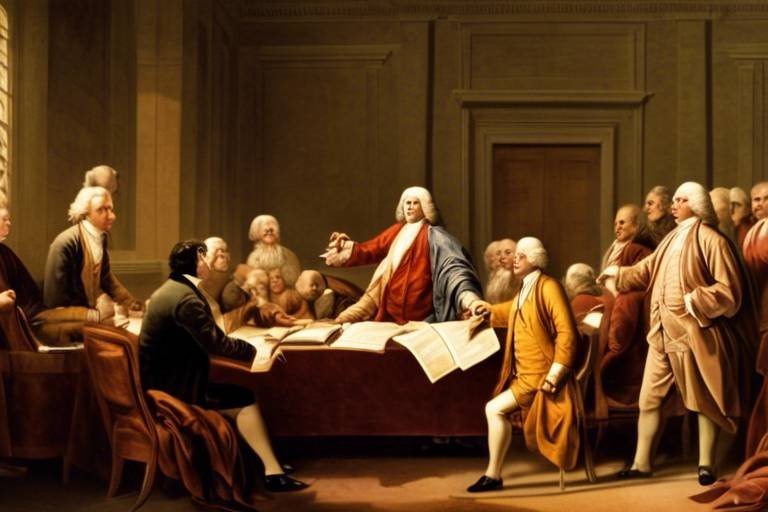Can Philosophy Overcome Political Polarisation?
In today's world, political polarisation seems to be a never-ending saga. It’s like watching two rival sports teams, each with their own set of fans, fiercely defending their colors while hurling insults at each other. But what if we could change the game? What if philosophy, that age-old discipline of critical thinking and ethical reasoning, could serve as the referee in this chaotic arena? The idea might sound far-fetched, but diving into philosophical discourse could be the key to bridging the divides that have become so entrenched in our society.
At its core, philosophy encourages us to question our beliefs, challenge our assumptions, and engage in meaningful dialogue. Imagine if we could apply these principles to our political conversations! Instead of shouting over each other, we might actually listen and understand the perspectives that differ from our own. It's not just about winning an argument; it's about fostering understanding and cooperation among opposing viewpoints. This article will explore how critical thinking and ethical reasoning can pave the way for a more harmonious political landscape.
So, can philosophy truly overcome political polarisation? The answer lies in our willingness to engage in thoughtful discourse, to embrace the complexities of ethical dilemmas, and to prioritize shared human values over divisive ideologies. By doing so, we can transform the battleground of politics into a collaborative space for growth and understanding. Let’s delve deeper into how we can achieve this through critical thinking, ethics, and the importance of dialogue.

The Role of Critical Thinking
In today's world, where political polarisation seems to be the norm, critical thinking emerges as a beacon of hope. It’s not just about having an opinion; it’s about understanding the nuances behind those opinions. Imagine walking into a room filled with people who have completely different beliefs. What do you do? Do you shout louder to make your point, or do you take a step back and evaluate the situation? Critical thinking encourages the latter. It equips individuals with the tools to dissect arguments, identify biases, and ultimately engage in more constructive dialogues.
At its core, critical thinking involves a few key components:
- Analysis: This means breaking down complex ideas into simpler parts. When we analyze political arguments, we can see what’s really being said and how it aligns or conflicts with our own beliefs.
- Evaluation: This is about assessing the credibility of sources and the strength of arguments. Are we listening to facts, or are we being swayed by emotions? Critical thinking helps us determine the difference.
- Reflection: After gathering information, we need to reflect on our own beliefs and consider how they might be influenced by external factors. This self-awareness is crucial in political discussions.
But how does critical thinking actually foster understanding in political discourse? Think of it as a bridge. When individuals engage in critical thinking, they start to see the human element behind opposing views. Instead of viewing someone with a different opinion as an enemy, they begin to understand the experiences and values that shape those beliefs. This shift in perspective is essential for creating a more inclusive dialogue.
Moreover, critical thinking encourages individuals to ask questions rather than make assumptions. For instance, rather than dismissing a perspective outright, one might inquire, “What experiences led you to that conclusion?” This simple question can open up pathways for dialogue that might otherwise remain closed. It’s about creating a safe space where ideas can be exchanged freely, without the fear of judgement or hostility.
Ultimately, the role of critical thinking in overcoming political polarisation cannot be overstated. It is a skill that can be cultivated, much like a muscle that strengthens with use. By actively engaging in critical thinking, we not only enhance our ability to communicate but also pave the way for a more empathetic and understanding political landscape. So, the next time you find yourself in a heated debate, take a moment to breathe and think critically. You might just find common ground where you least expect it.

Ethics in Political Discourse
When we dive into the murky waters of political discourse, one thing becomes crystal clear: ethics are not just an add-on; they are the very foundation of any meaningful conversation. In a world where opinions clash like titans, it’s crucial to bring ethics into the mix. Why? Because ethical frameworks can serve as guiding stars, helping us navigate through the stormy seas of partisan loyalties and personal biases. Imagine trying to build a bridge over a chasm of disagreement. Without a solid ethical foundation, that bridge is bound to collapse under the weight of conflicting interests.
So, how do we ensure that ethics play a pivotal role in our political discussions? First and foremost, we need to prioritize moral considerations over mere party allegiance. This shift in focus can transform debates from shouting matches into constructive dialogues. When participants are encouraged to consider the ethical implications of their positions, they are more likely to engage with one another in a respectful and understanding manner. Think of it this way: if we were all on a team, wouldn’t we want to play by the same rules? Ethics provide those rules, creating a level playing field where everyone’s voice matters.
Moreover, ethical discourse encourages us to examine not just our own beliefs, but also the beliefs of others. It pushes us to ask the tough questions: What is the impact of my stance on marginalized communities? or Am I considering the long-term consequences of my political decisions? By engaging in this kind of reflective thinking, we can foster a culture of empathy and understanding. This is where the magic happens—when we start to see the humanity in opposing viewpoints, we pave the way for genuine dialogue.
To illustrate this point further, let’s consider a few ethical principles that can guide political discourse:
- Respect for Persons: Every individual deserves to have their dignity acknowledged, regardless of their political stance.
- Justice: Fair treatment should be at the forefront of any political discussion, ensuring that all voices are heard.
- Common Good: Ethical discussions should aim for outcomes that benefit society as a whole, rather than just a select few.
By integrating these principles into our political conversations, we can create an environment that not only encourages diverse opinions but also fosters a sense of community. After all, isn’t that what we all want? A society where we can discuss our differences openly and honestly, without fear of being ostracized or attacked? When ethics take center stage, we can transform divisive debates into opportunities for growth and understanding.
In conclusion, the role of ethics in political discourse cannot be overstated. They are the compass that guides us through the complexities of differing viewpoints. By prioritizing ethical considerations, we can create a political landscape that is not only more inclusive but also more productive. So, the next time you find yourself in a heated political discussion, remember: ethics aren’t just important—they’re essential. Let’s build that bridge together, one ethical conversation at a time.

Utilitarianism and Its Implications
Utilitarianism, at its core, is a philosophical framework that advocates for actions that maximize overall happiness and well-being. In the context of political discourse, this principle can serve as a beacon of hope, guiding individuals and groups toward compromise and consensus. Imagine a world where political discussions are not battlegrounds but rather collaborative efforts aimed at achieving the greatest good for the greatest number. This is the essence of utilitarianism, and its implications for political dialogues are profound.
When we apply utilitarian principles to political discussions, we shift our focus from individual interests to collective welfare. This approach encourages participants to evaluate policies and decisions based on their potential outcomes rather than their alignment with partisan ideologies. For example, consider a community facing a contentious debate over resource allocation for public services. A utilitarian perspective would prompt stakeholders to ask, "Which option will yield the most significant benefit for the majority of our community members?" This question emphasizes the importance of weighing the consequences of various choices, fostering a more constructive dialogue.
Utilitarianism also invites us to consider the long-term effects of our political decisions. By emphasizing the need for sustainable solutions, we can encourage policymakers to look beyond immediate gains and think about the broader implications of their actions. This shift in perspective can lead to innovative approaches that prioritize the well-being of future generations, creating a legacy of responsible governance.
However, it's essential to recognize that utilitarianism is not without its challenges. One significant concern is the potential for justifying the sacrifice of minority rights in the name of the greater good. For instance, if a policy benefits the majority but imposes significant harm on a minority group, can we truly call that a just decision? This dilemma highlights the complexities of applying utilitarian ethics in real-world political scenarios. It raises critical questions about the balance between collective happiness and individual rights, urging us to tread carefully as we navigate these discussions.
Despite these challenges, there are numerous success stories that illustrate the power of utilitarianism in political negotiations. For example, consider the landmark healthcare reforms in various countries that aimed to provide universal access to medical services. By prioritizing collective welfare, these reforms have led to improved health outcomes for millions, demonstrating how utilitarian principles can lead to effective solutions even in polarized environments.
In conclusion, utilitarianism offers a compelling framework for reshaping political discussions. By focusing on the greater good, we can foster an environment where compromise and consensus thrive. While challenges remain, the potential for utilitarianism to bridge divides and promote understanding is a powerful reminder that, at the heart of political discourse, we all share a common goal: the pursuit of a better society for everyone.

Challenges of Utilitarianism
While utilitarianism presents a compelling framework for political discourse, it is not without its challenges. One of the primary concerns is the potential for utilitarian principles to justify the sacrifice of minority rights in favor of the majority's happiness. Imagine a scenario where a policy benefits a large group of people but severely impacts a smaller, vulnerable community. How do we reconcile the happiness of the many against the suffering of the few? This ethical dilemma raises significant questions about the moral implications of utilitarianism.
Moreover, the calculation of the "greater good" can be incredibly subjective and complex. Determining what constitutes the greater good often involves weighing various factors, which can lead to disagreements even among those who share similar values. For instance, when discussing environmental policies, some might argue that economic growth should take precedence, while others believe that sustainability should be prioritized. This divergence can create friction in political discussions, making it difficult to reach a consensus.
Another challenge lies in the potential for short-term thinking. Utilitarianism may encourage policymakers to focus on immediate benefits rather than long-term consequences. This can lead to decisions that are popular in the short run but detrimental in the long run. For example, a government might choose to cut funding for renewable energy projects to allocate resources to more immediate economic relief efforts. While this may provide temporary relief, it could hinder progress towards sustainable development.
Additionally, the application of utilitarianism in real-world scenarios can often be impractical. It requires comprehensive data and analysis to accurately assess the outcomes of decisions, which is not always feasible. Policymakers may lack the necessary information to make fully informed choices, leading to decisions based on incomplete assessments. This uncertainty can undermine the effectiveness of utilitarian approaches in political contexts.
Lastly, utilitarianism can sometimes foster a sense of moral relativism. If the focus is solely on outcomes, individuals may feel justified in compromising their ethical standards for the sake of achieving a perceived greater good. This can lead to a slippery slope where unethical actions are rationalized if they benefit the majority. Such scenarios can erode trust in political institutions and diminish the integrity of political discourse.
In summary, while utilitarianism offers valuable insights for navigating political polarization, it is essential to recognize and address these challenges. By critically examining the limitations of utilitarian ethics, we can better understand how to apply them in a way that respects individual rights and promotes a more equitable political landscape.

Success Stories
When we think about the power of utilitarianism in political negotiations, several come to mind, showcasing how prioritizing the collective good can lead to effective solutions even in the most polarized environments. One notable example is the Good Friday Agreement in Northern Ireland, which brought an end to decades of conflict. Here, leaders from opposing factions recognized that a compromise based on the greater good was essential for peace. They set aside their differences and focused on creating a framework that would benefit the entire community, illustrating the profound impact of utilitarian principles in political discourse.
Another compelling instance is the Affordable Care Act in the United States. Despite significant political division, various stakeholders, including politicians and healthcare advocates, came together to address the pressing issue of healthcare access. By applying utilitarian ethics, they focused on how the legislation would improve the lives of millions, fostering a sense of unity among those who typically disagreed. This example highlights how framing discussions around the collective welfare can lead to breakthroughs that seem impossible in a deeply divided political landscape.
Moreover, we can look at international climate agreements, such as the Paris Agreement. Countries across the globe, despite their differing political ideologies, recognized the urgent need to combat climate change for the sake of future generations. By prioritizing the long-term survival of our planet over short-term political gains, these nations exemplified how utilitarianism can facilitate cooperation even among the most entrenched adversaries. The success of such agreements demonstrates that when the focus shifts from individual interests to the common good, remarkable progress can be achieved.
These success stories serve as powerful reminders that while political polarization can seem insurmountable, there are pathways to collaboration and understanding. They illustrate that by embracing a utilitarian approach, we can find common ground and work together to tackle the pressing issues of our time. As we reflect on these examples, it's clear that the potential for change lies within the principles of ethics and dialogue, urging us to engage with one another in meaningful ways.

Virtue Ethics as a Framework
When we talk about political engagement, it’s easy to get lost in the noise of arguments and counterarguments. However, what if we shifted our focus from merely winning debates to fostering character and integrity? This is where virtue ethics comes into play. At its core, virtue ethics emphasizes the importance of developing moral character rather than strictly adhering to rules or consequences. Imagine a political landscape where empathy, respect, and honesty are the guiding principles—sounds refreshing, right?
Virtue ethics invites us to consider not just what we say but who we are as individuals. In a world rife with polarization, promoting virtues can lead to more meaningful political interactions. For instance, when politicians and citizens alike prioritize qualities like compassion and integrity, they create an environment where dialogue can flourish. This shift can transform contentious debates into opportunities for understanding and collaboration.
To illustrate the practical application of virtue ethics in politics, let’s consider a few key virtues that can guide us:
- Empathy: Understanding others' feelings and perspectives can help bridge divides and foster cooperation.
- Respect: Valuing differing opinions encourages open dialogue and diminishes hostility.
- Integrity: Upholding honesty and transparency builds trust among political actors.
By cultivating these virtues, we can create a political culture that prioritizes collaboration over conflict. It’s about encouraging individuals to engage with one another not just as opponents but as fellow citizens striving for the common good. This approach can lead to a more robust democracy where diverse viewpoints are not only tolerated but celebrated.
However, the journey toward embedding virtue ethics in our political discourse is not without challenges. For one, it requires a collective commitment to personal growth and accountability. Are we ready to hold ourselves and our leaders to higher standards? Additionally, there’s the question of how to effectively measure these virtues in political practices. Unlike policies or laws, virtues are inherently subjective and can vary across cultures and communities, making it essential to foster a shared understanding of what these virtues entail.
In conclusion, embracing virtue ethics as a framework for political engagement offers a promising pathway to reducing polarization. By focusing on character and the cultivation of essential virtues, we can create a political environment that encourages constructive dialogue and mutual respect. This approach not only benefits individuals but also strengthens the fabric of our democratic society, paving the way for a more inclusive and cooperative future.
- What is virtue ethics? Virtue ethics is a moral philosophy that emphasizes the importance of developing good character traits (virtues) rather than focusing solely on rules or consequences.
- How can virtue ethics help in political discourse? By promoting virtues like empathy and respect, virtue ethics can foster healthier discussions and reduce polarization in political debates.
- Are there challenges to implementing virtue ethics in politics? Yes, challenges include the subjective nature of virtues and the need for collective commitment to personal growth and accountability.

The Importance of Dialogue
Dialogue is the lifeblood of any thriving democracy. It’s the bridge that connects disparate ideologies and fosters understanding among individuals with varying perspectives. Without dialogue, we risk falling into the echo chambers of our own beliefs, where the only voices we hear are those that echo our own thoughts. This is where the magic of conversation comes into play. Imagine a world where everyone feels heard—where opposing views can be expressed without fear of backlash. Sounds utopian, right? But it’s entirely possible if we prioritize open communication.
When we engage in meaningful dialogue, we create an environment ripe for collaboration and compromise. The key is not just to speak, but to listen actively. Active listening involves fully concentrating, understanding, responding, and then remembering what is being said. It’s about putting aside our own agendas to genuinely grasp another person’s viewpoint. This doesn’t mean we have to agree with them, but it does mean we recognize their right to have a different opinion. In this way, dialogue becomes a two-way street, rather than a battleground.
Moreover, fostering dialogue can help dismantle the walls of misunderstanding that often lead to conflict. When individuals engage in discussions, they have the opportunity to clarify misconceptions and dispel stereotypes. For instance, when discussing sensitive political issues, it’s beneficial to approach the conversation with an open mind and a willingness to learn. Here are some strategies that can facilitate productive conversations:
- Create a Safe Space: Ensure that the environment is free from judgment and hostility. This encourages participants to share their thoughts openly.
- Encourage Questions: Foster an atmosphere where asking questions is welcomed. This can lead to deeper understanding and exploration of topics.
- Focus on Common Goals: Highlight shared interests or values that can serve as a foundation for discussion.
In addition, storytelling plays a crucial role in enhancing dialogue. When individuals share personal experiences related to political issues, it humanizes the conversation. Instead of abstract debates over policies, we hear real-life stories that evoke empathy and understanding. Picture this: a person shares their struggle with healthcare access, and suddenly the statistics and political rhetoric transform into a relatable narrative. This emotional connection can soften hardened stances and pave the way for more compassionate discussions.
Ultimately, the importance of dialogue cannot be overstated. It’s not merely about exchanging words; it’s about building bridges, fostering empathy, and creating a community where diverse opinions can coexist. When we embrace dialogue, we take the first step toward overcoming political polarization and nurturing a society that values understanding over division.
- Why is dialogue important in politics? Dialogue allows for the exchange of ideas and perspectives, which is essential for understanding and cooperation in a diverse society.
- How can I improve my dialogue skills? Practice active listening, ask open-ended questions, and approach conversations with an open mind.
- What role does storytelling play in dialogue? Storytelling humanizes issues and fosters empathy, making it easier for people to connect across differing viewpoints.

Facilitating Productive Conversations
When it comes to bridging political divides, can be a game-changer. Imagine walking into a room filled with people holding vastly different beliefs. The air is thick with tension, and the potential for conflict looms large. However, with the right approach, these conversations can transform from battlegrounds into opportunities for understanding. So, how do we create an environment where open dialogue thrives?
First and foremost, establishing ground rules for discussions is essential. These rules should promote respect and encourage participants to listen actively. For instance, everyone should have the chance to speak without interruption, and personal attacks should be strictly off-limits. When individuals feel safe to express their thoughts, they are more likely to engage meaningfully. Here are some key ground rules to consider:
- Listen to understand, not to respond: Encourage participants to genuinely absorb what others are saying, rather than preparing their rebuttal.
- Stay on topic: Focus on the issue at hand to prevent the conversation from spiraling into unrelated areas.
- Be open-minded: Approach discussions with a willingness to consider alternative viewpoints.
Another vital aspect of facilitating productive conversations is the role of a neutral moderator. This person can help guide the discussion, ensuring that all voices are heard and that the conversation remains constructive. A skilled moderator can also identify when tensions rise and intervene to refocus the dialogue on shared values. Think of them as a referee in a sports match, ensuring that the game is fair and enjoyable for everyone involved.
Additionally, utilizing active listening techniques can significantly enhance the quality of conversations. This involves not just hearing words but also understanding the emotions and intentions behind them. Techniques like paraphrasing and summarizing can help participants feel validated. For instance, saying, “What I hear you saying is…” can clarify misunderstandings and build rapport among individuals. By creating a space where people feel understood, we pave the way for more fruitful discussions.
Lastly, it’s crucial to encourage participants to share personal stories related to the political issues on the table. Personal narratives can humanize abstract concepts and make them relatable. When individuals hear stories that resonate with their own experiences, they’re more likely to empathize with opposing views. It’s like painting a vivid picture that helps others see the world through a different lens.
In conclusion, facilitating productive conversations is about creating a respectful and open environment where individuals can engage with one another without fear. By setting ground rules, employing a neutral moderator, practicing active listening, and sharing personal stories, we can transform divisive discussions into opportunities for connection and understanding. Remember, the goal isn’t to convince others to change their minds but to foster a culture of respect and dialogue, where every voice matters.
Q: How can I encourage others to participate in political discussions?
A: Start by creating a welcoming environment, establishing ground rules, and expressing genuine interest in others' perspectives.
Q: What should I do if a conversation becomes heated?
A: As a moderator or participant, it’s essential to intervene calmly, remind everyone of the ground rules, and steer the conversation back to respectful dialogue.
Q: How can storytelling help in political discussions?
A: Sharing personal stories can humanize issues and foster empathy, making it easier for individuals to connect across differing viewpoints.

Building Empathy Through Storytelling
Have you ever found yourself deeply moved by a story? Perhaps it was a film, a book, or even a friend's personal experience that resonated with you. Storytelling is a powerful medium that transcends barriers, making it an essential tool in bridging political divides. When we share our narratives, we invite others into our world, fostering a sense of connection that is often lost in heated debates and polarized discussions.
In the realm of politics, where opinions can clash like titans, storytelling serves as a gentle reminder of our shared humanity. By humanizing political issues, we allow others to see the faces behind the statistics and the emotions behind the policies. For instance, when discussing immigration, a personal story about a family's journey can evoke empathy, shifting the conversation from abstract policies to real-life implications. This emotional engagement can lead to more productive dialogues, as individuals begin to understand the motivations and struggles of those on the "other side."
Moreover, storytelling can break down the walls of misunderstanding and fear. When we hear someone’s story, we’re not just listening to words; we’re experiencing their reality. This experience can be transformative. It encourages us to consider perspectives we may have previously dismissed. Empathy is born from connection, and storytelling is the bridge that connects diverse viewpoints.
To harness the power of storytelling in political discourse, we can adopt several strategies:
- Encourage Personal Narratives: Create platforms where individuals can share their experiences related to political issues. This could be through community forums, social media campaigns, or storytelling events.
- Promote Active Listening: When someone shares their story, practice active listening. This means fully engaging with the speaker, asking questions, and reflecting on their experiences without immediately responding with counterarguments.
- Utilize Different Mediums: Stories can be shared in various forms—videos, podcasts, written articles, or visual art. Each medium can reach different audiences and evoke unique emotional responses.
As we embrace storytelling, we must remember that the goal is not to change someone's mind overnight. Rather, it’s about planting seeds of understanding and empathy. These seeds may take time to grow, but with patience and openness, they can blossom into a more compassionate political landscape.
In conclusion, the art of storytelling is not just a method of communication; it’s a means of building bridges in a world that often feels divided. By sharing our stories, we create opportunities for connection, understanding, and ultimately, a more empathetic society. So, the next time you find yourself in a political discussion, consider sharing a story. It might just change the way someone sees the world.
- How can storytelling help in political discussions? Storytelling allows individuals to share personal experiences, fostering empathy and understanding, which can lead to more constructive dialogues.
- What types of stories are most effective? Personal narratives that convey real-life experiences related to political issues tend to resonate more and encourage emotional engagement.
- How can I encourage storytelling in my community? Create safe spaces for sharing stories, host events, and utilize social media to promote personal narratives related to current political issues.
Frequently Asked Questions
- What is the role of critical thinking in overcoming political polarization?
Critical thinking serves as a vital tool in navigating the murky waters of political polarization. It helps individuals dissect arguments, identify biases, and engage in more meaningful discussions. By honing these analytical skills, people can move beyond surface-level disagreements and explore the deeper reasoning behind opposing views.
- How can ethics influence political discourse?
Ethics plays a crucial role in shaping political conversations. When participants prioritize moral considerations over blind loyalty to partisan ideologies, it fosters a more inclusive environment. This ethical approach encourages individuals to consider the implications of their arguments on the greater good, leading to more constructive dialogues.
- What is utilitarianism, and how does it apply to political discussions?
Utilitarianism is a philosophical framework that emphasizes actions that promote the greatest good for the greatest number. In political discussions, applying utilitarian principles can encourage compromise and consensus, helping to bridge divides. However, it also raises questions about the potential sacrifice of minority rights, highlighting the complexities of real-world applications.
- Can you provide examples of successful utilitarian applications in politics?
Absolutely! There have been several instances where prioritizing collective welfare has led to effective solutions in polarized environments. For example, policies that focus on public health initiatives often reflect utilitarian principles, aiming to benefit the majority while addressing the needs of various communities.
- What is virtue ethics, and how does it contribute to political engagement?
Virtue ethics emphasizes the importance of character and integrity in political interactions. By fostering virtues such as empathy and respect, individuals can mitigate polarization and create healthier political discussions. This approach encourages participants to engage with one another as human beings, rather than mere representatives of opposing ideologies.
- Why is dialogue important in bridging political divides?
Dialogue is essential for overcoming political divides because it promotes open communication and active listening. When people engage in genuine conversations, they can uncover shared values and find common ground, even amidst differing opinions. This process helps to humanize political issues and fosters a greater understanding of diverse perspectives.
- What strategies can facilitate productive conversations about politics?
Creating safe spaces for dialogue is key to facilitating productive conversations. Encouraging individuals to express their views without fear of hostility allows for more open exchanges. Techniques such as active listening, asking clarifying questions, and summarizing others' points can also help maintain a respectful and constructive atmosphere.
- How can storytelling build empathy in political discussions?
Storytelling is a powerful tool for fostering empathy because it personalizes political issues. By sharing personal narratives, individuals can humanize abstract concepts, making it easier for others to connect emotionally. This connection can break down barriers and encourage more compassionate discussions across ideological lines.



















